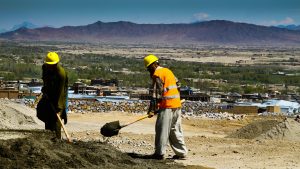Initially an inherited afterthought from the days of the Islamic Republic, the National Development Corporation (NDC) has risen to new prominence under the Taliban government in Afghanistan. As the regime improves Afghanistan’s irrigation, digs more mines, and constructs new infrastructure, the state-owned enterprise will play a key role in the years to come.
The Islamic Emirate has limited options to bring in new equipment and sign infrastructure deals, with much of the regime’s leadership still under sanctions from the days of the insurgency. Further, many of the regime’s key water projects come at the cost of Afghanistan’s neighbors. While these countries collaborate with the Taliban on other projects, the Afghan government needs a dependable construction manager of its own for many critical initiatives. The NDC has filled this gap, enabling the Taliban regime to pursue its goal of self-sufficiency, and limiting dependence on outside aid for the projects most important to the emirate.
Then-President Ashraf Ghani established the NDC in 2020 to consolidate eight state-owned construction, food, agricultural, and housing enterprises. Ghani named Abdul Rahman Attash, a veteran of the Ministry of the Rural Rehabilitation and Development who had ties to Hekmatyar Gulbuddin’s Hizb-e-Islami party, to run the NDC. Reportedly, Ghani even gave Attash nearly $750,000 to support internally displaced persons the day before the Republic collapsed.
As the Taliban consolidated power over the government and adapted the remnants of the Republic to its needs, the group shut down several state-owned enterprises and regulatory authorities. The National Development Corporation might seem an odd choice to survive the government overhaul. However, Attash has successfully transitioned from the Republic to the Emirate, keeping his role as leader of the NDC and sustaining the support of Taliban senior leaders.
The transition between governments has not come without problems. In 2022, the NDC claimed that work stopped on more than 600 projects as a result of the change in governments. Later the same year, a lack of reliable, domestic coal to power the plants temporarily disrupted cement production and halted the few remaining projects.
Further, there have been concerns about the quality of the NDC’s work on its crown jewel project, the Qosh Tepa Canal. Experts have decried the NDC’s design and construction practices for the 285-kilometer canal. While the NDC has mustered 5,500 people and 3,300 pieces of equipment for the project, there are concerns the canal’s design will lose large amounts of water to evaporation and seepage. Further, water overran the canal’s banks in November 2023 and created a 20 square kilometer lake. While the NDC claimed it was a planned release to compensate for an unexpected inflow of groundwater, regional NGOs have expressed skepticism.
This year, there have been accusations that the Taliban confiscated and redirected assets from the NDC to support other activities across 19 provinces. It is unknown if the NDC successfully regained its assets.
However, the NDC persisted through the turmoil, steadily growing in prominence. In the Taliban’s 2022-23 budget, the government restarted many of the previous canceled projects, with $16 million going to the NDC for the work. Business has picked up from there. From March 2023 to March 2024, the government allocated $23 million for the NDC to conduct projects across the country including canals, mines, dams, industrial parks, and hospitals. The Afghan government announced that the NDC will upgrade the Kajaki Dam in Helmand Province, the Kamal Khan Dam in Nimruz Province, and several hydroelectric projects around Kabul.
Details on the 2024-2025 budget are sparse, so it is unclear the extent to which the Taliban will employ the NDC in the coming year. It seems likely the corporation will be busy, however.
The NDC has secured several agreements to ensure it has access to the human and physical resources it needs to secure additional government projects. The Ministry of Higher Education signed an agreement to recruit graduates from Afghanistan’s higher education institutions directly into the NDC.
The NDC has also worked to secure its own construction supplies. Nearly all of Afghanistan’s domestically produced cement comes from the NDC. The corporation owns both the Jabal Siraj Cement Factory, north of Kabul, and the Ghori Cement Factory in Baghlan Province. The NDC has upgraded both facilities, with Ghori finishing a notable upgrade in 2022. In October 2023, the interim government secured a $220 million investment from a Qatari firm to upgrade the Jabal Siraj Cement plant, while the Ghori Cement Factory received a second upgrade in July.
Further, the Taliban government provided the NDC with exclusive control over 21 coal mines in Sar-e Pol Province which will both power the corporation’s cement plant and provide much needed revenue to finance further work on the Qosh Tepa Canal.
As business booms, regular visits from Taliban interim ministers and deputy prime ministers to NDC headquarters further affirm the corporation’s importance and staying power.
As with many of Afghanistan’s improvement efforts, the interim Taliban government remains extraordinarily far from its publicly proclaimed goal of self-sufficiency. For example, even with the upgrades the NDC produces only one-tenth of Afghanistan’s cement needs, according an Afghan expert. However, the Taliban’s use of a Ghani-era state-owned enterprise to conduct internal development projects is a prime example of how the group has adapted its governance to meet new challenges.
The ability of the NDC to provide durable and effective infrastructure projects will be a key measure of the Taliban’s governing effectiveness over the next two to three years. If the Taliban can retain sufficient public and business human capital to complete its development plans, the regime can buy time to protect itself from international pressure and further cement its complete control over the populace of Afghanistan.

































